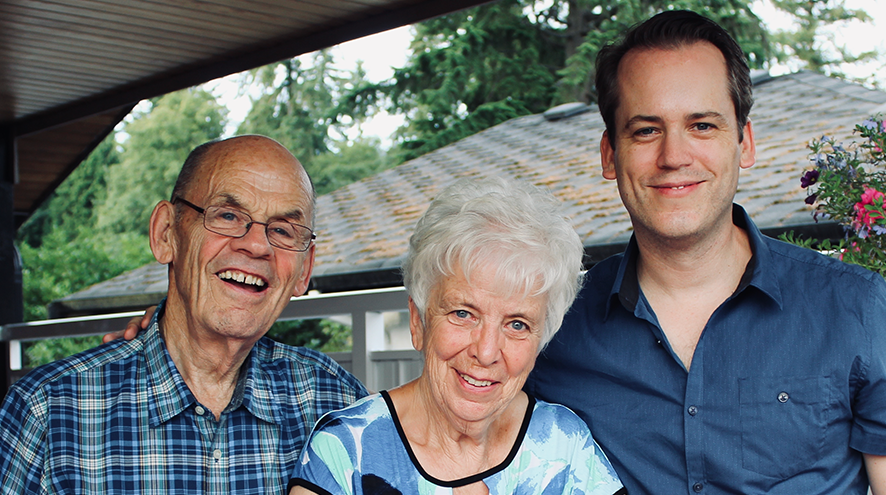Don't change: Aaron Craven's story
Meet one of the British Columbians sharing their stories as part of Alzheimer’s Awareness Month 2022.

Throughout January, the Alzheimer Society of B.C. is recognizing Alzheimer’s Awareness Month by highlighting the experiences of British Columbians affected by dementia to say, “Don’t change. Even if they do.” For many people living with dementia and their caregivers, the dementia journey can feel very isolating. However, sustaining relationships is essential for the well-being of people facing the disease, whether they live in the community or in long-term care.
This year, British Columbians are sharing their experiences and thoughts on the value of staying connected to people in our lives who are affected by the disease, whether they’re living with dementia or caring for someone who is. Among them is Aaron Craven, a caregiver from Vancouver, B.C.
Aaron’s dementia journey began in 2016, when his family doctor called him into the office and told him that both of his parents were living with dementia. While his mother Peggy’s diagnosis of Alzheimer’s disease made sense – she’d started to repeat herself and was experiencing hallucinations – Aaron was shocked to learn that his father, Don, was living with vascular dementia. “After I left the doctor’s office, I ended up having to pull over to the side of the road to cry,” Aaron says.
Aaron didn’t have the luxury of taking time to absorb the reality of his parents’ situation. A busy film and television actor with a newborn son, Aaron had to quickly shift gears and begin caregiving for both of his parents. He connected with a case manager and arranged for home support. “It was strange to see dementia progress in both of them at the same time,” Aaron says.
Within a year, Peggy and Don were at the point where they needed to more support. Eventually, Aaron was able to get his parents set up in long-term care. But their diseases progressed at different rates: Don passed away in 2018 and Peggy still lives with dementia in long-term care.
After facing challenges navigating the health-care system, Aaron has developed a passion for raising awareness and advocating for more dementia-friendly approaches to supporting people living with dementia. He’s shared his story with media and wrote a play about his experiences.
As Peggy’s symptoms have changed, Aaron has needed to find new ways to connect with her. “Language isn’t the only way we communicate,” he says. “As soon as I play music for her, tickle her knee, take her outside in her wheelchair – she perks up!” Before the pandemic, Peggy also benefitted from visits with her grandson: “I can’t overstate the impact that seeing him has on her. There’s nothing like the presence of a child to bring a whole memory unit to life.”
The realities of COVID-19 have stressed the value of that connection, even as it has made finding it that much harder. Aaron received temporary essential visitor status earlier in 2021 and was able to see Peggy again. After provincial restrictions on visitation were tightened again last week in light of the Omicron variant, Aaron, like so many other caregivers, is unable to see his mother and is concerned about her well-being. “Technology isn’t a practical solution for someone in the late stages of dementia,” he says. “Only in-person visitation, with the immediacy it carries, makes a difference for a loved one living in long-term care.”
Learn more about the campaign
Want to learn more? Read some of the other stories being shared throughout the month and visit dontchange.ca to find out more about the campaign.
